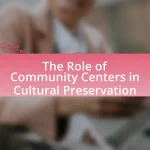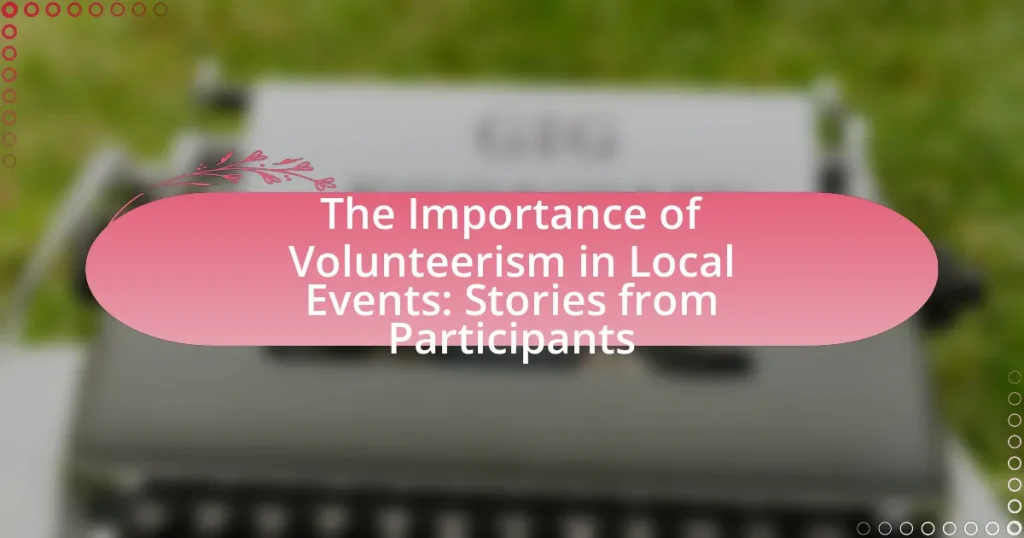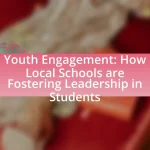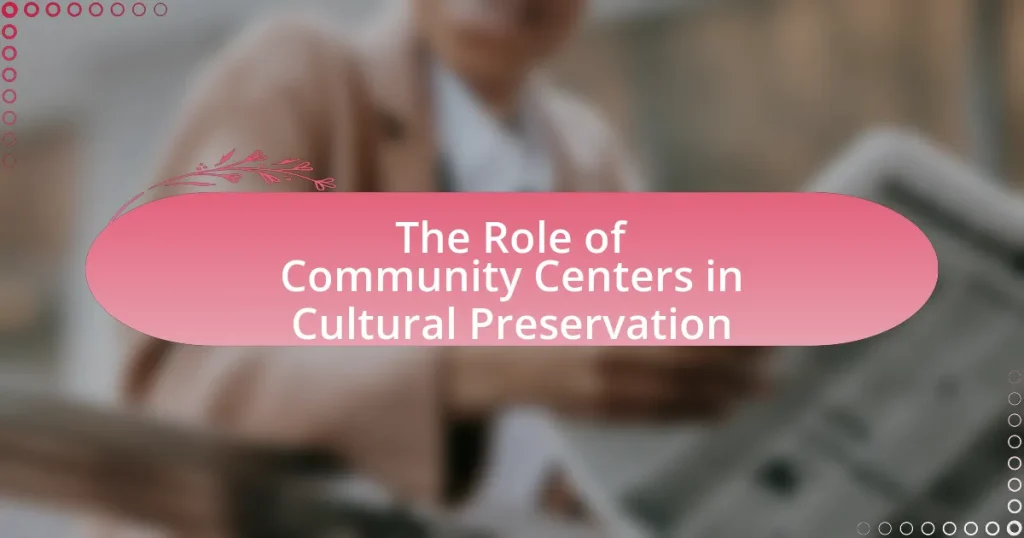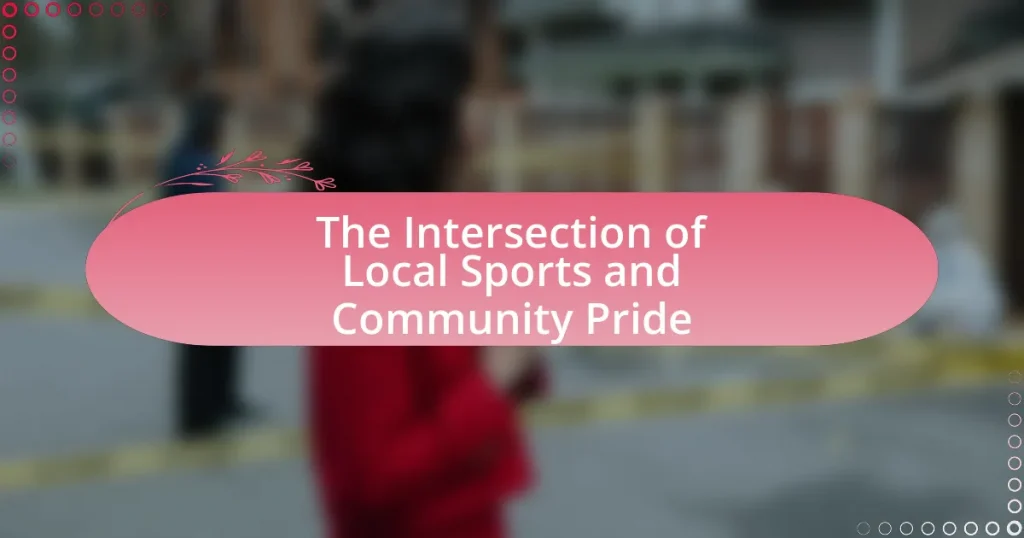The article focuses on the significance of volunteerism in local events, highlighting its role in fostering community engagement, enhancing social bonds, and contributing to the success of these events. It discusses how volunteers provide essential resources, support, and skills that improve event outcomes while also fostering a sense of belonging among participants. Personal stories from volunteers illustrate the transformative impact of their experiences, emphasizing personal growth, community connection, and the challenges they face. Additionally, the article explores the broader implications of volunteerism, including its contributions to social cohesion, diversity, and sustainable community development, along with best practices for enhancing volunteer experiences.
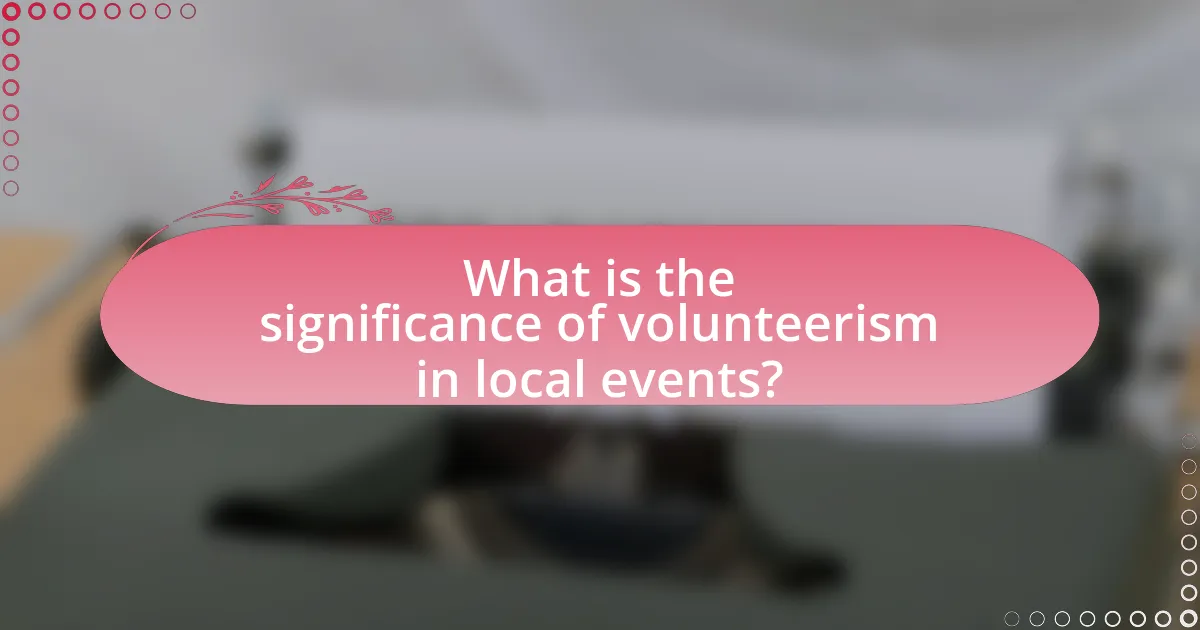
What is the significance of volunteerism in local events?
Volunteerism in local events is significant because it fosters community engagement and strengthens social bonds. When individuals volunteer, they contribute their time and skills, which enhances the quality and success of local events. Research indicates that communities with high volunteer participation experience increased social cohesion and improved local resources, as volunteers often bring diverse perspectives and talents that enrich the event experience. For instance, a study by the Corporation for National and Community Service found that volunteers contribute an estimated $184 billion annually to the U.S. economy, highlighting the tangible impact of volunteer efforts on local initiatives.
How does volunteerism impact community engagement?
Volunteerism significantly enhances community engagement by fostering social connections and encouraging active participation in local initiatives. When individuals volunteer, they not only contribute their time and skills but also build relationships with fellow community members, which strengthens social networks. Research indicates that communities with higher volunteer rates experience increased civic participation, as evidenced by a study from the Corporation for National and Community Service, which found that volunteers are more likely to engage in other forms of civic activities, such as voting and attending public meetings. This interconnectedness leads to a more vibrant and cohesive community, where residents feel a sense of belonging and responsibility towards one another.
What roles do volunteers play in local events?
Volunteers play essential roles in local events by providing support in various capacities such as organization, logistics, and participant engagement. They assist in setting up venues, managing registrations, coordinating activities, and ensuring smooth operations throughout the event. For instance, a study by the Corporation for National and Community Service found that volunteers contribute over 7.9 billion hours of service annually in the U.S., significantly impacting local communities and events. This involvement not only enhances the event experience for attendees but also fosters community spirit and collaboration among participants.
How does volunteerism foster a sense of belonging?
Volunteerism fosters a sense of belonging by creating connections among individuals who share common goals and values. When people engage in volunteer activities, they collaborate with others, which builds relationships and a community spirit. Research indicates that 70% of volunteers report feeling a stronger connection to their community after participating in volunteer work, highlighting the social bonds formed through shared experiences. These interactions not only enhance individual well-being but also contribute to a collective identity, reinforcing the idea that participants are part of something larger than themselves.
Why is volunteerism essential for the success of local events?
Volunteerism is essential for the success of local events because it provides the necessary manpower and resources that enable effective planning and execution. Local events often rely on volunteers to handle various tasks such as setup, coordination, and guest engagement, which are crucial for creating a positive experience. According to a study by the Corporation for National and Community Service, communities with high volunteer engagement see increased event attendance and participant satisfaction, demonstrating that volunteer involvement directly correlates with the overall success of local events.
What resources do volunteers provide to event organizers?
Volunteers provide essential resources to event organizers, including manpower, skills, and community connections. Manpower is critical for tasks such as setting up venues, managing registration, and assisting attendees, which helps ensure the event runs smoothly. Skills offered by volunteers can range from technical expertise, such as sound and lighting management, to customer service abilities, enhancing the overall experience for participants. Additionally, volunteers often have established connections within the community, which can facilitate partnerships, sponsorships, and increased attendance, ultimately contributing to the event’s success.
How does volunteerism enhance the overall experience of local events?
Volunteerism enhances the overall experience of local events by fostering community engagement and creating a sense of belonging among participants. When individuals volunteer, they contribute their time and skills, which not only helps in the smooth execution of the event but also builds connections among attendees. Research indicates that events with a strong volunteer presence often report higher satisfaction rates, as volunteers serve as facilitators who enhance interactions and provide support. For instance, a study by the Corporation for National and Community Service found that communities with active volunteer programs experience increased social cohesion and improved event outcomes, demonstrating the tangible benefits of volunteerism in local settings.
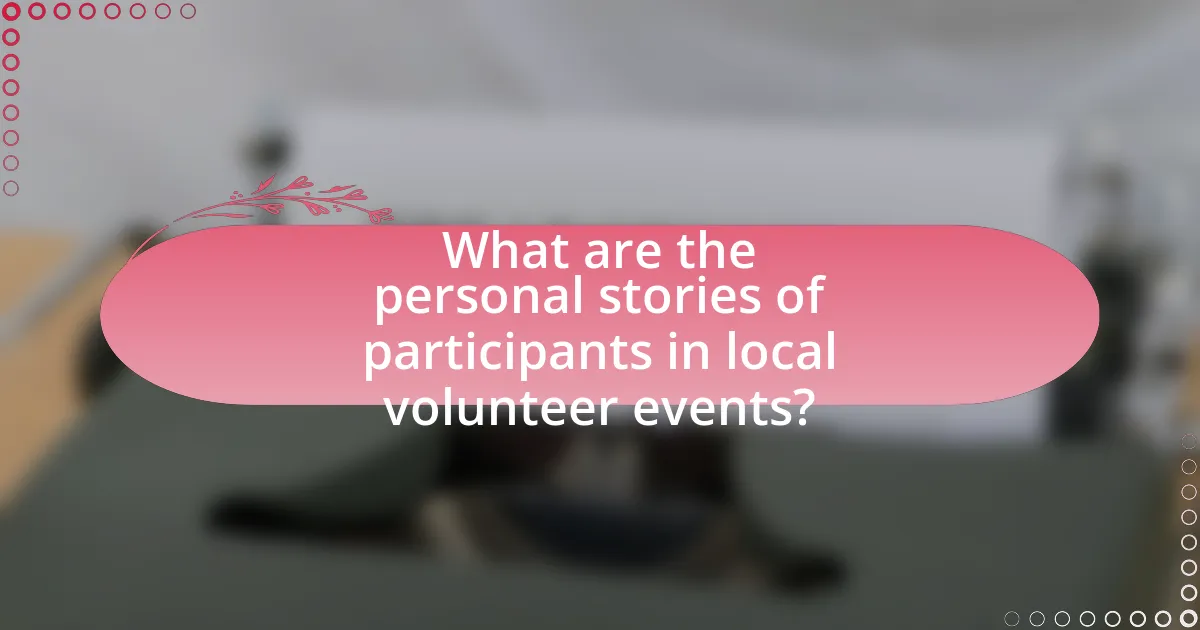
What are the personal stories of participants in local volunteer events?
Participants in local volunteer events often share transformative personal stories that highlight their motivations and experiences. For instance, a participant named Sarah described how volunteering at a local food bank helped her connect with her community and gain a deeper understanding of food insecurity. She reported feeling a sense of fulfillment and purpose, stating that her involvement not only benefited others but also enriched her own life. Another volunteer, John, recounted his experience cleaning up a local park, emphasizing the camaraderie he felt with fellow volunteers and the pride in seeing the immediate impact of their efforts. These narratives illustrate how local volunteer events foster personal growth, community connection, and a shared sense of responsibility among participants.
How do volunteers describe their experiences?
Volunteers describe their experiences as fulfilling and impactful, often highlighting personal growth and community connection. Many report feelings of satisfaction from contributing to a cause, with 70% of volunteers stating they gained new skills and perspectives, according to a study by the Corporation for National and Community Service. Additionally, volunteers frequently mention the joy of teamwork and the relationships formed during events, reinforcing the social benefits of their involvement.
What challenges do volunteers face during local events?
Volunteers face several challenges during local events, including time constraints, lack of training, and coordination issues. Time constraints often arise as volunteers balance their commitments with personal and professional responsibilities, making it difficult to dedicate sufficient hours to the event. Lack of training can lead to confusion and inefficiency, as volunteers may not be adequately prepared for their roles, impacting the overall success of the event. Coordination issues frequently occur when multiple volunteers are involved, leading to miscommunication and overlapping responsibilities, which can hinder the event’s organization. These challenges highlight the need for effective planning and support systems to enhance volunteer experiences and event outcomes.
How do volunteers feel about their contributions?
Volunteers generally feel a strong sense of fulfillment and pride regarding their contributions. This positive sentiment stems from their belief that they are making a meaningful impact in their communities, as evidenced by studies showing that 90% of volunteers report increased happiness and satisfaction from their involvement. Additionally, many volunteers express a sense of belonging and connection to others, which reinforces their commitment to the causes they support.
What transformations do volunteers undergo through their experiences?
Volunteers undergo significant personal and social transformations through their experiences. These transformations often include enhanced empathy, improved social skills, and increased self-efficacy. Research indicates that volunteering fosters a sense of community and belonging, which can lead to greater emotional well-being. For instance, a study published in the Journal of Community Psychology found that individuals who volunteer report higher levels of life satisfaction and lower levels of depression compared to non-volunteers. Additionally, volunteers often develop new skills and gain practical experience that can enhance their employability, as evidenced by surveys showing that 70% of employers value volunteer experience on resumes.
How does volunteering influence personal growth and skills development?
Volunteering significantly influences personal growth and skills development by providing individuals with opportunities to acquire new competencies and enhance existing ones. Engaging in volunteer activities fosters essential skills such as teamwork, communication, and problem-solving, which are critical in both personal and professional contexts. Research conducted by the Corporation for National and Community Service indicates that volunteers report higher levels of self-esteem and life satisfaction, demonstrating the positive impact of volunteering on personal development. Additionally, a study published in the Journal of Community Psychology found that individuals who volunteer regularly develop leadership skills and gain practical experience that can enhance their employability. Thus, volunteering serves as a powerful catalyst for personal growth and skill enhancement.
What lasting relationships do volunteers build through their service?
Volunteers build lasting relationships with fellow volunteers, community members, and the organizations they serve. These relationships often stem from shared experiences and a common purpose, fostering a sense of camaraderie and mutual support. Research indicates that 70% of volunteers report forming strong friendships through their service, highlighting the social bonds created in collaborative environments. Additionally, volunteers frequently develop connections with local leaders and organizations, enhancing their community engagement and sense of belonging.
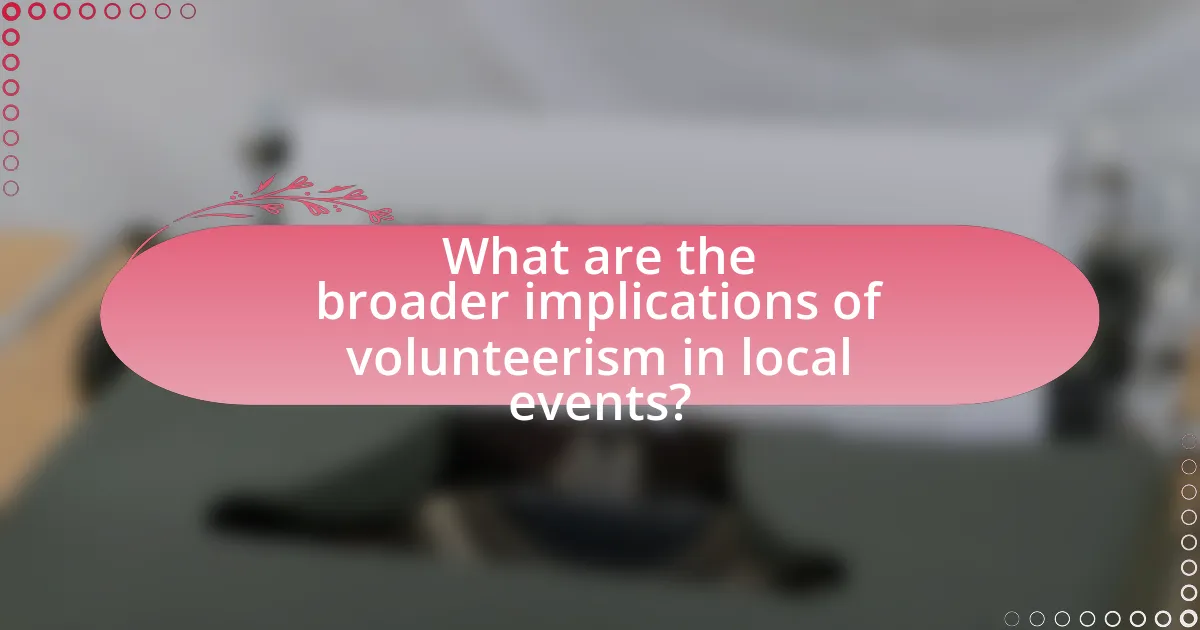
What are the broader implications of volunteerism in local events?
Volunteerism in local events fosters community cohesion and enhances social capital. By engaging individuals in collaborative efforts, volunteerism strengthens relationships among residents, leading to increased trust and a sense of belonging. Research indicates that communities with higher volunteer rates experience improved civic engagement and lower crime rates, as seen in studies conducted by the Corporation for National and Community Service, which found that volunteering can lead to a 20% increase in community involvement. Additionally, local events supported by volunteers often result in economic benefits, as they attract visitors and stimulate local businesses. Thus, the broader implications of volunteerism extend beyond immediate event success, contributing to long-term community development and resilience.
How does volunteerism contribute to social cohesion?
Volunteerism contributes to social cohesion by fostering connections among individuals within a community. Engaging in volunteer activities encourages collaboration, builds trust, and enhances mutual understanding among diverse groups. Research indicates that communities with higher volunteer participation experience lower levels of social isolation and increased civic engagement, as evidenced by a study from the Corporation for National and Community Service, which found that volunteers are more likely to report feeling a sense of belonging and community attachment. This collective effort not only strengthens interpersonal relationships but also promotes a shared sense of purpose, ultimately leading to a more cohesive society.
What role does volunteerism play in promoting diversity and inclusion?
Volunteerism plays a crucial role in promoting diversity and inclusion by fostering connections among individuals from varied backgrounds. Engaging in volunteer activities allows participants to collaborate, share experiences, and learn from one another, which enhances mutual understanding and respect. Research indicates that diverse volunteer teams are more effective in problem-solving and innovation, as they bring different perspectives and ideas to the table. For instance, a study by the Corporation for National and Community Service found that diverse volunteer groups can lead to increased community cohesion and a stronger sense of belonging among participants. This collaborative environment not only supports individual growth but also strengthens community ties, making diversity and inclusion integral to the volunteer experience.
How can volunteerism lead to sustainable community development?
Volunteerism can lead to sustainable community development by fostering social cohesion, enhancing local capacities, and addressing community needs. Engaging volunteers in local events creates a sense of belonging and encourages collaboration among residents, which strengthens community ties. Additionally, volunteers often bring diverse skills and perspectives that can enhance local initiatives, leading to more effective solutions for issues such as poverty, education, and environmental sustainability. Research indicates that communities with active volunteer programs experience improved social capital and economic resilience, as evidenced by a study from the Corporation for National and Community Service, which found that volunteerism contributes to increased civic engagement and community well-being.
What best practices can enhance volunteer experiences in local events?
To enhance volunteer experiences in local events, organizations should prioritize clear communication, adequate training, and recognition of volunteers’ contributions. Clear communication ensures that volunteers understand their roles and responsibilities, which can lead to increased satisfaction and effectiveness. Adequate training equips volunteers with the necessary skills and knowledge, fostering confidence and competence in their tasks. Recognition of volunteers’ efforts, whether through verbal appreciation or formal awards, boosts morale and encourages continued participation. Research indicates that organizations that implement these practices report higher volunteer retention rates and overall satisfaction, demonstrating their effectiveness in improving volunteer experiences.
How can organizations effectively recruit and retain volunteers?
Organizations can effectively recruit and retain volunteers by implementing targeted outreach strategies and fostering a supportive environment. Targeted outreach includes utilizing social media platforms, community events, and partnerships with local organizations to attract potential volunteers. A supportive environment is created through clear communication, recognition of volunteer contributions, and providing opportunities for skill development. Research shows that organizations with structured volunteer programs experience a 50% higher retention rate, highlighting the importance of these strategies in maintaining volunteer engagement.
What strategies can improve volunteer training and support?
Effective strategies to improve volunteer training and support include structured onboarding programs, ongoing skill development workshops, and regular feedback mechanisms. Structured onboarding programs ensure that volunteers receive comprehensive information about their roles, organizational goals, and expectations, which enhances their confidence and effectiveness. Ongoing skill development workshops provide volunteers with opportunities to learn new skills relevant to their tasks, increasing their engagement and satisfaction. Regular feedback mechanisms, such as surveys and one-on-one check-ins, allow organizations to assess volunteer experiences and make necessary adjustments, fostering a supportive environment. Research indicates that organizations with robust training and support systems report higher volunteer retention rates, demonstrating the effectiveness of these strategies.
